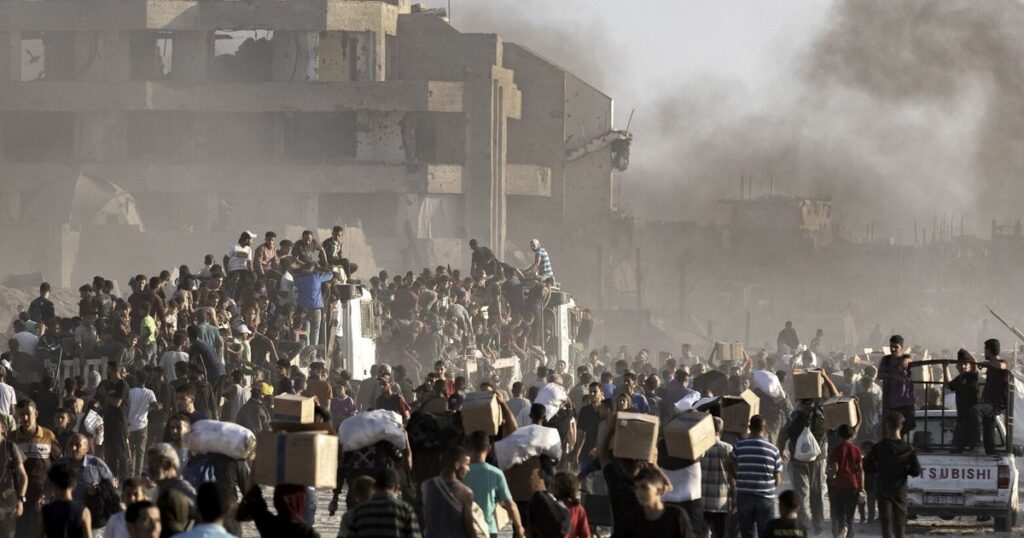The world’s Arab countries for the first time have joined unanimously in the call for Hamas to lay down its weapons, release all hostages and end its rule of the Gaza Strip, conditions that they said could help the establishment of a Palestinian state.
The surprise declaration, endorsed Tuesday by the 22 member nations of the Arab League, also condemned Hamas’ Oct. 7 attacks on Israel, which set off the devastating war in Gaza. The statement came at a United Nations conference in New York on a two-state solution to end the decades-long conflict between Israelis and Palestinians.
“In the context of ending the war in Gaza, Hamas must end its rule in Gaza and hand over its weapons to the Palestinian Authority, with international engagement and support, in line with the objectives of a sovereign and independent Palestinian state,” said the declaration. It was also signed by all 27 European Union states and 17 other countries.
The declaration called for the deployment of “a temporary international stabilization mission,” invited by the Palestinian Authority, which administers part of the Israeli-occupied West Bank, and “under the aegis of the United Nations.”
Many Arab leaders have working relations with Hamas and rule over populations that are deeply committed to the Palestinian cause. That has made them reluctant to break publicly with the group and to normalize relations with Israel, despite pressure from Western allies like the United States. Qatar hosts Hamas’ political office and some of its political leaders, and has acted as a mediator between the group and both Israel and the United States.
John V. Whitbeck, an international lawyer who has advised the Palestinian negotiating team in talks with Israel and has been working on the conflict for nearly 40 years, said he was not aware of a similar declaration having been made by Arab states in the past. But he noted that most Arab governments are opposed to movements that politicize Islam “and even those who might sympathize with armed resistance would feel that Hamas must be eliminated militarily and politically for the West to be fully engaged in ending the occupation.”
It remains unclear whether Hamas would heed the call of the Arab League. Hamas has so far demonstrated no willingness to voluntarily surrender its weapons or give up control over Gaza. Its initial response to the declaration was mixed but did not suggest a significant shift.
“Any effort made at the international level to support our Palestinian people and their legitimate rights is appreciated and welcomed,” the group said in a statement on Thursday demanding “unconditional international recognition” of an independent Palestinian state.
The Hamas statement did not directly respond to the call to disarm. “The Palestinian situation is an internal affair of our people,” it said.
Hamas called for reforms of the Palestine Liberation Organization, which represents Palestinians internationally and is led by the Palestinian Authority president, Mahmoud Abbas. It also demanded presidential, legislative and other elections “based on national and democratic foundations without any preconditions.”
At the United Nations, the high-level conference on a two-state solution, cosponsored by France and Saudi Arabia, unfolded as reports of starvation in Gaza continued to arrive. Images of small children and babies dying of hunger have set off global outrage against Israel for preventing humanitarian aid from entering the territory at the scale needed to avert severe food shortages.
The conference, which started Monday and ended Wednesday, drew widespread support. Representative of 125 U.N. member states took part, delivering speeches in support of a Palestinian state and urging Israel to commit to a two-state solution.
Analysts said that while many challenges remained — first and foremost the lack of support from Washington — the attempt to resurrect the idea of a Palestinian state was notable.
“Any effort to return international focus to the two-state solution is laudable, especially after almost two years of war and suffering between Israelis and Palestinians,” Max Rodenbeck, Israel-Palestine director at the International Crisis Group, said in a statement before the conference. “However, rhetorical support needs to be matched by practical steps, as the practical possibility for creating a Palestinian state on the ground has been ebbing for years, and under the current Israeli government faces stubborn hostility.”
Israel and the United States denounced the conference, saying that it was premature. The conditions on the ground — a continuing war, Israeli hostages still being held captive and militant groups still operating in Gaza and the West Bank — did not allow for a permanent peace or Palestinian statehood.
“No token recognition and no U.N. resolution will change the basic fact that there are those in the world who fight terrorists and extremist forces and then there are those who turn a blind eye to them,” said the Israeli ambassador to the U.N., Danny Danon.
Israeli leaders, including Prime Minister Benjamin Netanyahu, have said the declarations on Palestinian statehood reward Hamas’ actions, make it harder to reach a ceasefire in Gaza, and endanger Israeli security.
Hamas, in its statement, expressed a similar sentiment about the calls for normalizing relations with Israel that were part of the declaration that emerged from the conference. “Talk about integrating the Zionist entity into the region is a reward to the enemy for its crimes,” it said.
Last week, France’s president, Emmanuel Macron, announced that his country would recognize a Palestinian state and would formalize it in September. Britain soon followed suit, announcing that it would recognize a Palestinian state in September if there was no ceasefire agreement in Gaza.
Other countries have indicated their willingness to recognize a Palestinian state before the annual U.N. General Assembly in the fall. Among them are Australia, Canada, Finland, Malta, Portugal and New Zealand.
A document called the “New York Declaration,” which provides a phased road map for ending the nearly 80-year conflict between Israelis and Palestinians and the creation of a Palestinian state, was circulated among U.N. member states, who have until September to endorse it before the General Assembly.

